Contact management has come a long way in the past 30 years. Many people still remember the days of having a Rolodex sitting on everyone’s desk with dozens if not hundreds of cards that represented leads, customers, or suppliers.
The concept was great, but the execution had a lot of room for improvement. Those contact cards couldn’t be everywhere at once and were limited to what you could write on them. They served primarily as storage and didn’t prompt any action.
Modern contact management solutions paved the way for seamless tracking of every contact and interaction, so you engage loyal customers, close more deals, and maintain important relationships.
In this article, you’ll learn what contact management is, why it’s important, and what to look for in contact management software.
What is contact management?
In technical terms, contact management is a record-keeping process that tracks customer, vendor, and stakeholder information for your business.
Put plainly, a contact management system keeps up with all the people you know.
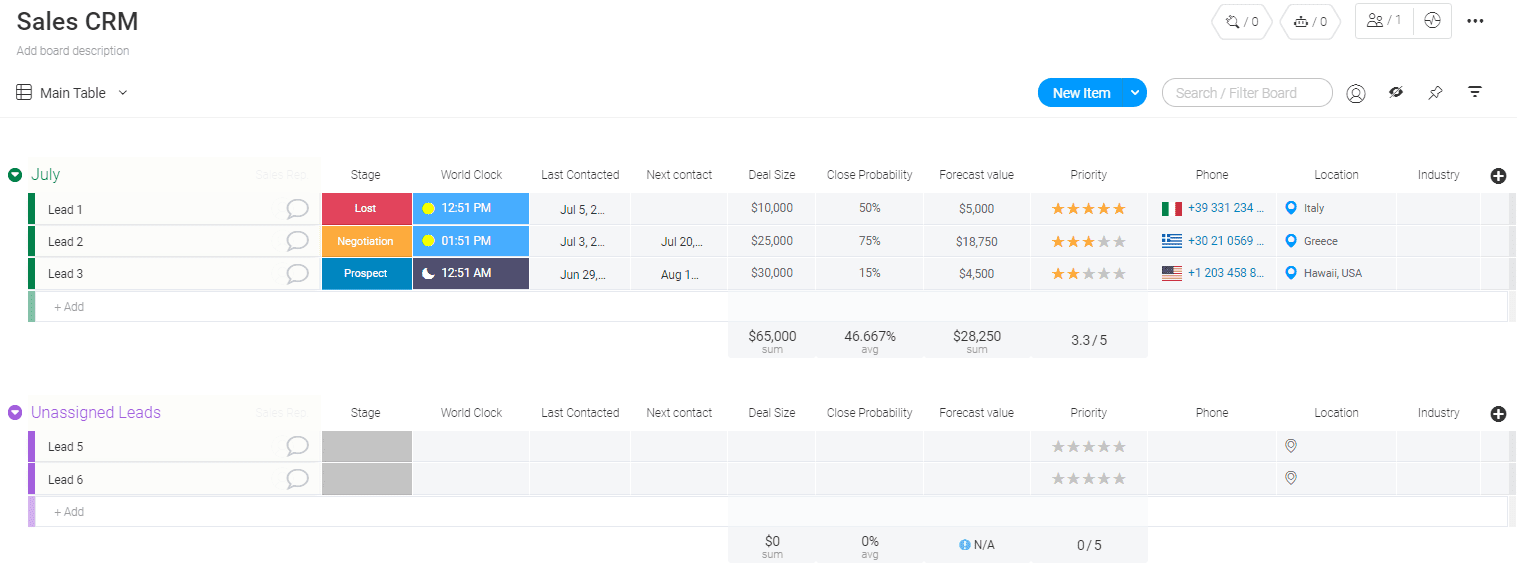
That information often includes a contact’s name, address, phone number, and order history.
Contact management systems have evolved far beyond a storage unit for contact data and are now full-fledged customer relationship management (CRM) solutions.
A Contact management database and CRMs both allow their user base to track each contact record individually.
The CRM evolved to leverage a wider range of data, including emails sent and received, phone calls exchanged, mail and packages delivered, and other forms of engagement.
A data-driven business saves energy, time, money, and resources. Plus, it gives you insights you can’t find anywhere else.
A business might use one of these systems to manage communications with prospects, existing customers, or past customers.
Why is contact management important?
Many people use the terms contact management and CRM interchangeably, which isn’t necessarily wrong.
All CRM systems have contact management built-in, and there are very few people looking for true contact management systems that only store customer data and don’t have communication features.
Where traditional contact management is simply a storage solution, a CRM facilitates the maintenance and strengthening of relationships.
Contact management software is certainly a step up from a Rolodex, however. It will save you time and money and help keep your contacts organized and visible.
But contact management software within a wider CRM provides valuable information both you and your team can use for years to come.
A CRM system is more advanced and layers on marketing, customer service, and sales capabilities. As face-to-face meetings decline, more organizations are relying on technology to fill the gap.
In fact, 65% of companies use CRM tools today.
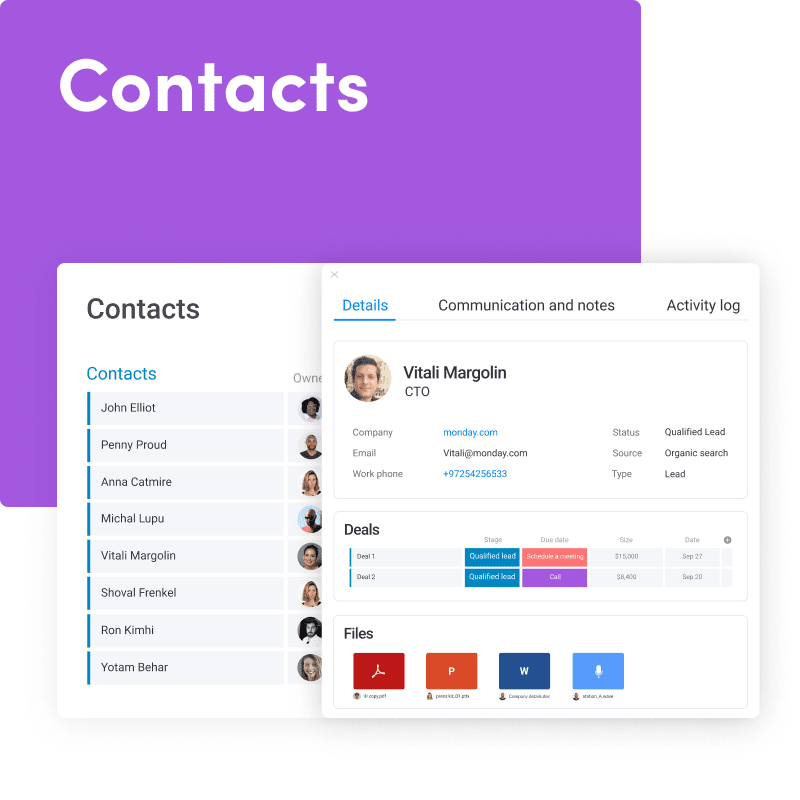
With effective contact management, even large companies can act like a small business and build personal relationships.
Each sales cycle will lean on detailed segmentation of both existing customers and prospects, so your sales team is always 2 steps ahead of the customer’s wants and needs.
The importance of personalizing communication
Every great business understands the importance of a customer sales funnel. One that provides relevant content based on customer data and their readiness to buy.
Here’s where a CRM system will really shine for your organization.
Without built-in contact management, your marketing campaigns will lack personalization. They’ll come off automated, scripted, and in all likelihood deliver lackluster results.
Your team will forget pertinent details like what the customer ordered previously, what emails or promotions they responded to best, and what features they’re dying to see.
In short, contact management keeps relationships from going stale and ensures your business prioritizes client preferences and retention at all times.
How do you gather personal insights to strengthen your relationships?
Every business is different, as is the customer experience they offer. Many of these personal insights come from day-to-day interactions.
This can include phone calls, emails, and face-to-face interactions like having lunch or grabbing drinks with someone.
In the moment, the sales team or customer service rep will take the time to jot down someone’s name, number, and a few details about them they want to remember.
Social media is a great way to find public information that could strengthen your bond too.
All data goes right into the CRM software so the organization can either place them in the appropriate sales funnel or strengthen the customer profile already on file.Surveys are another way that companies help segment customers and learn more about their interests and preferences.
With a Work OS like monday.com, you can gather info from sources across your entire organization.
The app can store data on how customers reacted to certain marketing campaigns, past sales history, and whether they ever called customer service to praise or complain. This all helps build a picture of them as a person and a consumer.
What to look for in a contact management platform
Choosing the right contact management software for your business is tricky.
For starters, you’ll always want to get one that’ll store all your data but still have room to grow with you. It’s also essential to get one that’s easy to use and mobile-friendly.
With those bases covered, let’s get into the details that truly separate each tool:
Survey capture capabilities
We touched on the power of surveys above, but to truly understand their power, it’s important to know what’s possible.
You can use them internally to monitor the health of your organization by sending out engagement surveys that gauge employee satisfaction.
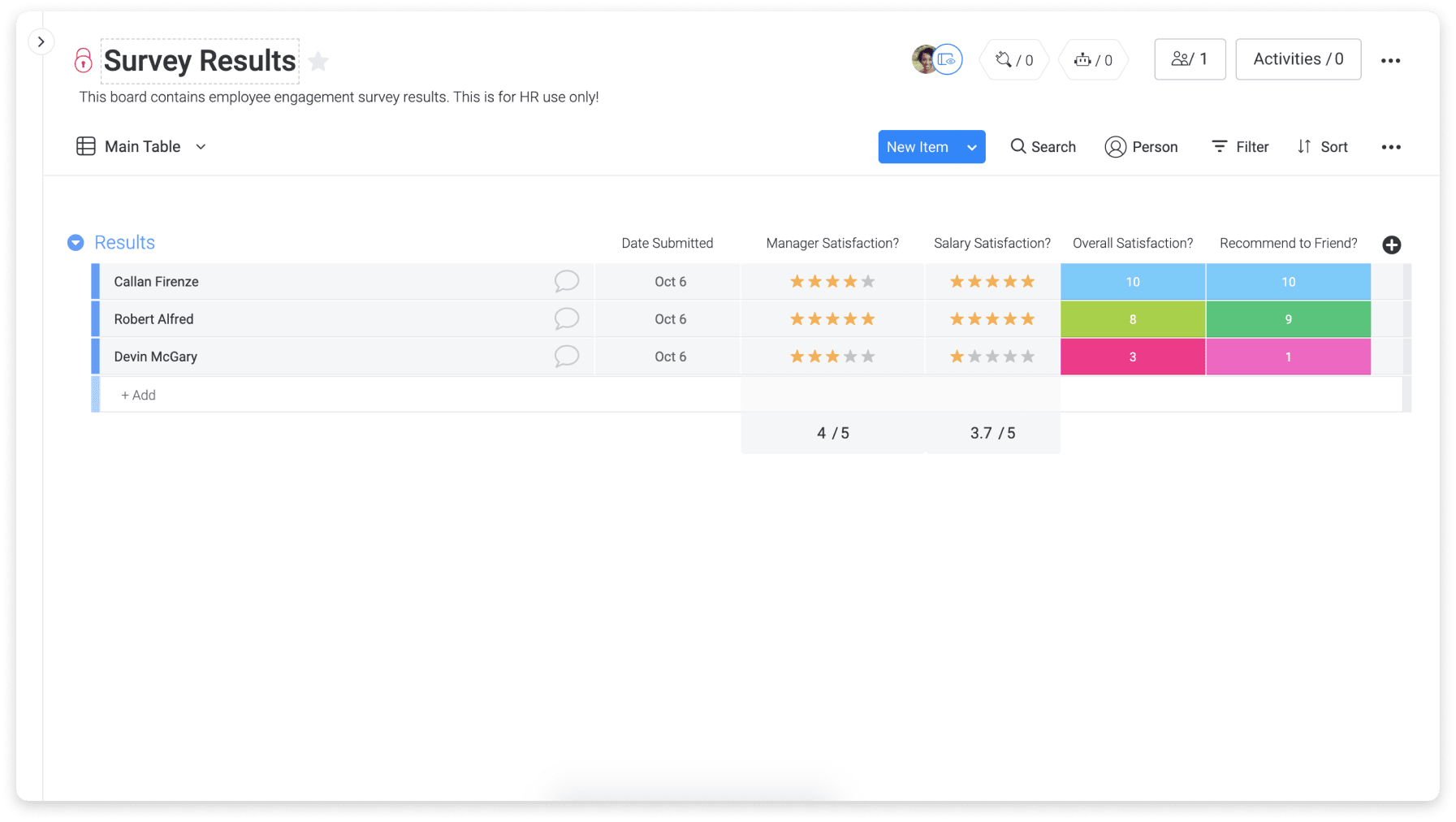
Alternatively, you can send them out to each business contact to track customer satisfaction and even prompt new product innovation.
monday.com lets you integrate surveys with emails to send out at the perfect moment. You can gather customer information and feedback when it’s most useful.
Beyond gathering internal and external data, you can also create detailed chart widgets that provide real-time insights.
Activity capture
True contact management comes down to saving all your customer data and activities in the app so your team can use it to enhance relationships and close more business.
That means capturing calls, meetings, emails, and anything else you can think of related to your contacts that can help shape future interactions. All of it goes into your CRM software.
The beauty of monday.com’s contact management features is that you get custom fields on your boards.
In our Work OS, we call them columns. They range from tagging people and checking their account status to custom tags. The list of column possibilities feels endless.
Deadlines and reminders
Arguably the biggest differentiator between contact management software and a true CRM is the ability to automate reminders.
We’ll get into true automation in a moment, but what we’re talking about now is date tracking.
That means keeping up with important deadlines, so you know what to deliver and when. It could mean scheduling an important delivery or ensuring you’re not leaving a prospect waiting for a follow-up.
Rather than leaving these details to chance, you can schedule them with monday.com.
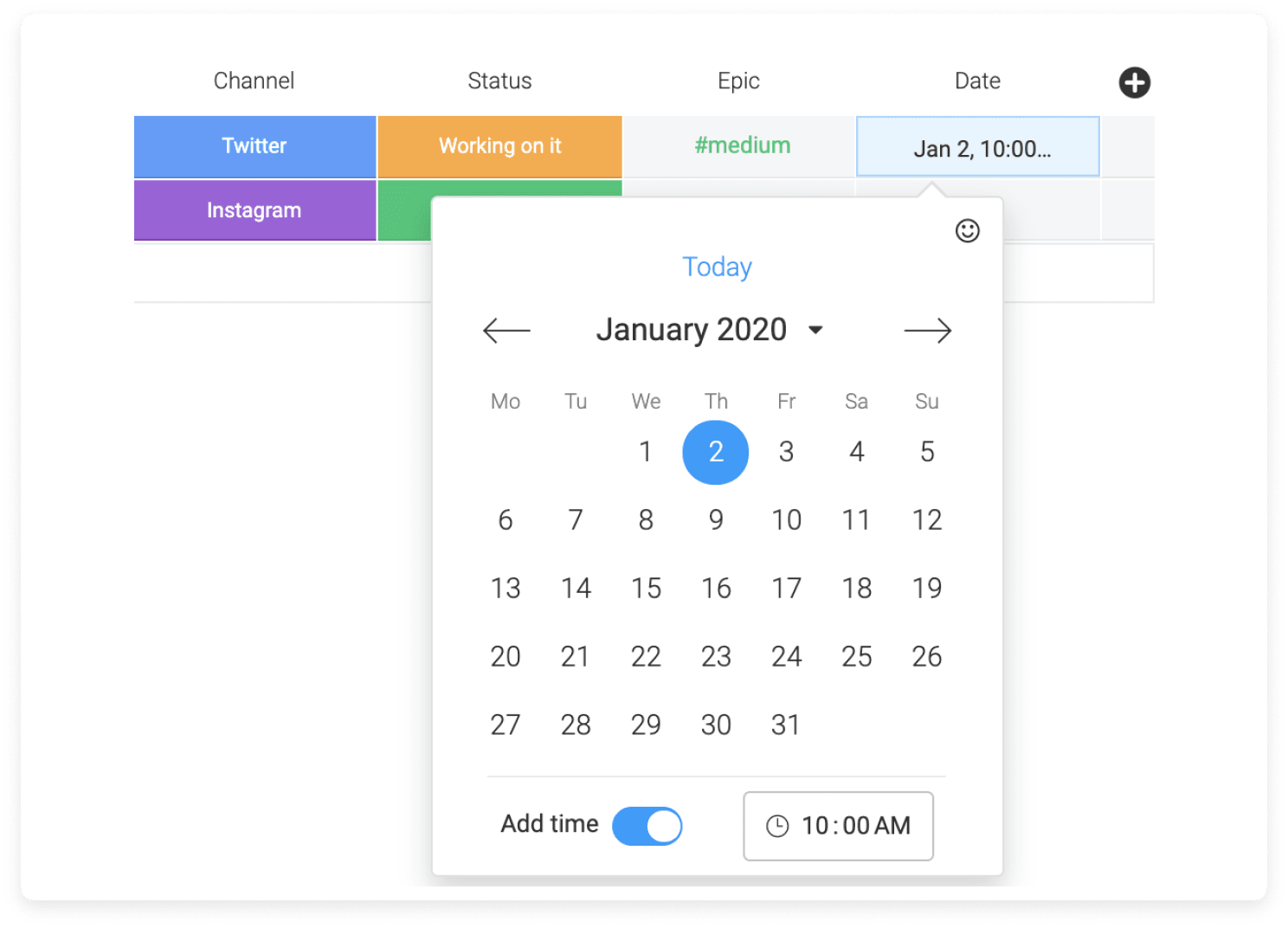
Each business or contact can have its own board or row and has the capacity for a date or timeline column. You can track dates related to leads, sales, existing customers, and past customers.
Time tracking
Knowing the local time for contacts is vital. monday.com makes it easy, so you don’t have to do any timezone math in your head.
But that’s not the time tracking we’re talking about here. We mean logging time in the monday.com app.
Perhaps it’s not just sales you’re tracking in your contact management system. It could be pertinent customer projects for your business.
In that case, you need a solution that not only keeps up with your contact but allows you to keep track of time, so you know exactly what to bill for or where the team is spending their time.
Effective time tracking enables your team to create accurate estimates, plug any productivity leaks, invoice more accurately, and effectively manage resources.
Custom automations
It’s one thing to store your contact data, but how about taking action on it? That’s where monday.com truly shines.
Not only does it eliminate data entry and admin work, but it can streamline communications between your sales team and the customer or any internal communications.
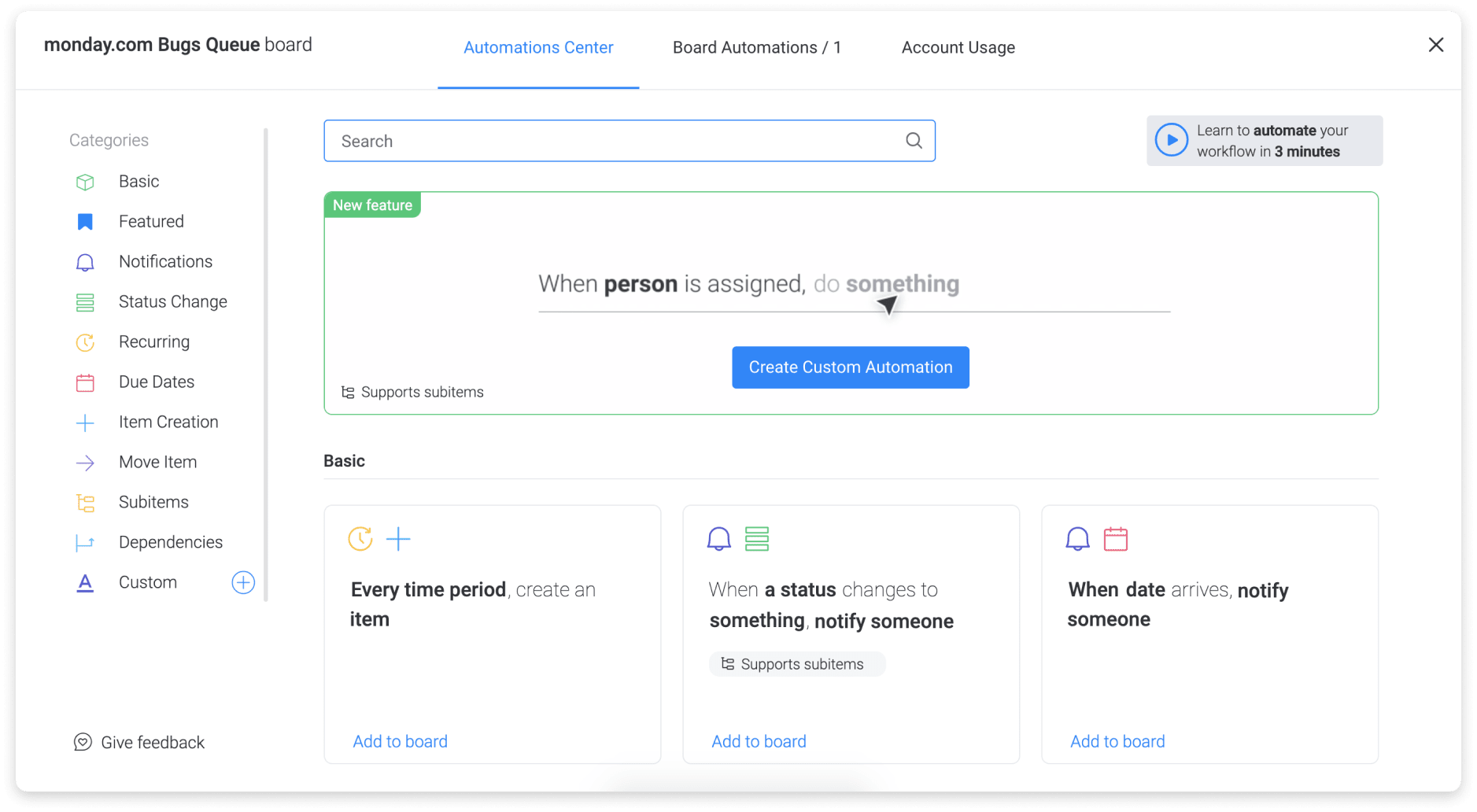
What if you could provide stakeholders or managers with updates based on automated triggers?
monday.com lets you do that too. All your data gets stored neatly and will work for your business. It doesn’t get much better than that.
Reach out at the perfect time with monday.com
monday.com enables you to do your best work. You can easily track all your data, relationships, and tasks in one place.
Everyone has access to the data they need and can rest easy knowing that monday.com is the single source of truth for the whole organization.

